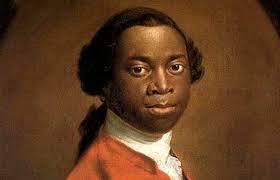ON TUESDAY afternoon (May 24th), a new BBC radio docudrama, I made with fellow producer Deborah Hobson, will chart the life and times of a remarkable forgotten black British hero, who died 225 years ago. It is called The Amazing Life of Olaudah Equiano and is being broadcast at 4pm on BBC Radio 4.
Sadly, programmes like this made by black independent production companies like ours, The-Latest Ltd, are rare. When I asked a Radio 4 executive commissioner if she knew of any others working with her history department she said a forlorn “no”. It’s as if, in British broadcasting, the game-changing Black Lives Matter movement, spearheaded by radical youth demanding change, had never happened.

An outstanding autobiography, The Interesting Narrative of the Life of Olaudah Equiano, Or Gustavus Vassa, The African, was published in 1789, and became a bestseller in the author’s own lifetime.
It ran to nine editions and attracted support from many notables. Among the aristocrats Equiano managed to charm to sponsor its publication were the Royal Duke of York.
He also got prominent figures to do national newspaper book reviews, including leading women’s rights campaigner Mary Wollstonecraft.
By any standards, the life of Olaudah Equiano was incredible. An Igbo born in the kingdom of Benin, in 1745, in what is now Nigeria, Equiano was enslaved as a child. He was transported to Barbados, where he stayed for just a couple of weeks, and then to the British North American colony of Virginia. He also spent time on the Caribbean island of Montserrat.
Equiano was bought as a boy by Royal Navy lieutenant Michael Henry Pascal, who forcibly renamed him Gustavus Vassa, after a reforming Swedish king in a play the officer liked. Equiano became Pascal’s unpaid servant.

Equiano was taught to read, write and do maths on British naval ships he was on where classes for crew were common. Later, Robert King, an American Quaker and merchant, bought Equiano and encouraged his slave to earn money by working as a trader with him.
Equiano became a gauger, a weights and measures person who inspected bulk goods aboard ships that were subject to tax. That meant he was too valuable to his master to be put to work as simply a plantation slave.
In 1766, Equiano did something that was very unusual at the time when he bought his freedom from King for what would be about £10,000 in today’s money – the same amount his master had paid for him. It is significant King was a Quaker because they were in the forefront of the abolition movement.
As a sailor, Equiano had a life of travel and adventure. But it was as a free man living in London in the 1780s that he found fame when he became involved in the abolitionist movement.
Most British school children are taught white MP William Wilberforce was the most significant abolition movement campaigner. But Equiano proves that is not the full story. Outside parliament, Equiano, working with people like Thomas Clarkson, who briefed Wilberforce, were arguably just as important.
Equiano’s book, the first of its kind written by a former slave, played a huge role by shocking British society with its vivid description of the horrors of the Atlantic Ocean Middle Passage when human cargo from Africa were transported in appalling conditions from Africa to the Americas and Caribbean. Some academics put the number of slaves at 15 million over 400 years – more than a million of them dying at sea.
Equiano died in 1797, 10 years before parliament outlawed the British slave trade. It was almost 30 years afterwards that slavery itself was abolished in British territories. There are some places in the world where it still exists today.


Comments Form
7 Comments
Thank you for this. I read Equiano’s book when I was trying to educate myself about the presence of Africans here. I can never thank him enough for writing it.
What is taught in schools still appears to have one aim only – to ensure that nothing is learned about social or racial discriminations in the country. No poverty, no transportation of the poor and prisoners to Australia etc. And no fortunes made from the trade in enslaved Africans, and from the plantation worked by them. Nothing about the how Europeans divided Africa among themselves at a conference in Berlin once they exporting Africans. And goodness me, we can certainly never teach the origins of our royal family!
As a white Quaker, I recognise my ongong priveleges.
I regret past associations, including wealth creation, particularly thorugh the slave trade. I state that simply as being a British citizen.
Wonderfully written and inspirational book a story that needs to be told to a new UK audience.
Such a worthy programme to profile this man of such tenacity, integrity and of his active role in being pivitol and instrumental in the abllition of slavery esp. in Britain.
So relevant to British and world history.
Worthy of being included into school curriculum
A brilliant programme. I believe Equiano is going to be taught at GCSE shortly, after the campaigning work of the Equiano Society, London.
I do believe that schools have a part to play in the teaching of black history which is by extention just history. But I also belive that we has a community need to also educate ourselves and our children of our own history. More black weekend schools teaching History Finance Maths English Crypto Stocks and Coding etc etc let future proof us now and the next generation.
INSPIRATIONAL – anyone able to catch-up with a repeat of Radio 4’s broadcast today 24.05.22. at 4pm, or as a podcast, couldn’t fail to be impressed by ‘The Amazing Life of Olaudah Equiano’ – in every respect, definitely worth a 5-star rating *****